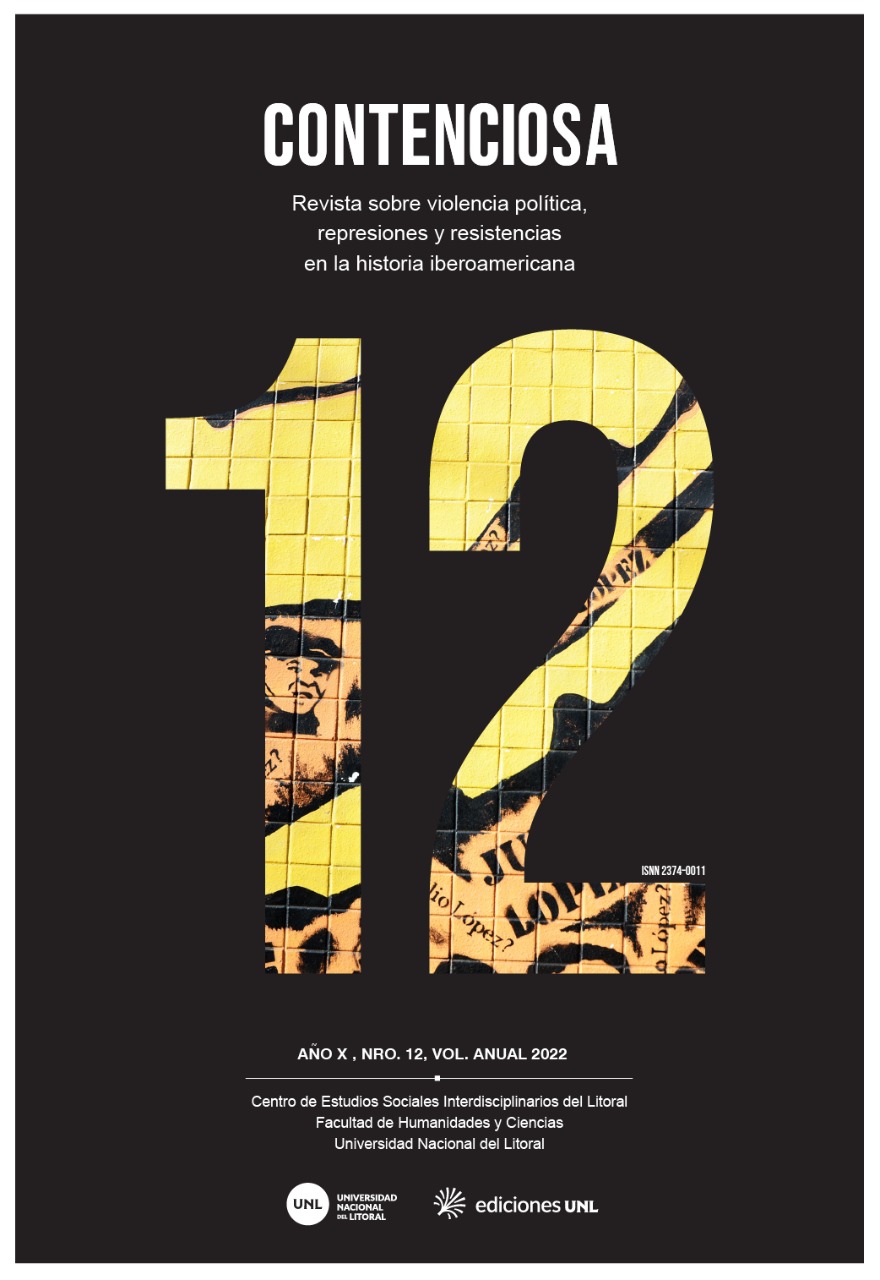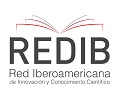Justificando el golpe chileno. Las operaciones del pasado en los escritos políticos e historiográficos de Gonzalo Vial
DOI:
https://doi.org/10.14409/rc.10.12.e0017Palavras-chave:
Dictadura, Chile, Justificación, Historiografía, Gonzalo VialResumo
Este artículo analiza el devenir político-historiográfico por el que transitó el historiador conservador Gonzalo Vial para justificar el golpe de Estado de 1973 en Chile. El principal hito al respecto fue su participación en el Libro Blanco del cambio de gobierno en Chile, una de las más destacadas operaciones de manipulación histórica para legitimar a la dictadura militar. Proponemos que Vial utilizó la misma matriz interpretativa para justificar el golpe de Estado y la represión posterior tanto en sus intervenciones políticas como en producción historiográfica anterior y posterior a 1973. Dicha interpretación se basó en principios constantes a lo largo de todo este período: la tesis de la decadencia sostenida de la nación, la ruptura de los consensos y la inminencia de una guerra civil. Ese tipo de discursos legitimadores del golpe lograron proyección pública no sólo a través de su obra periodística e historiográfica, sino también en instancias estatales particularmente sensibles como la llamada Comisión Rettig. De esa manera, a la manipulación inicial le siguió una racionalización intelectual que no renunció al objetivo de justificar históricamente la existencia de la dictadura militar.
Referências
Arancibia Clavel, P. (2006). Cita con la historia. Editorial Biblioteca Americana.
Casals, M. (2016). La creación de la amenaza roja. Del surgimiento del anticomunismo en Chile a la “campaña del terror” de 1964. LOM Ediciones.
Casals, M. (2021). The Insurrection of the Middle Class: Social Mobilization and Counterrevolution during the Popular Unity Government, Chile, 1970–1973. Journal of Social History, 54(3), 944–969. https://doi.org/10.1093/jsh/shz110
Christiaens, K., Rodríguez García, M., & Goddeeris, I. (Eds.). (2014). European Solidarity with Chile: 1970s - 1980s. Lang, Peter Frankfurt.
Colegio de Ingenieros de Chile. (1974). Libro blanco de la Ingeniería chilena. Talleres Gráficos Corporación.
Collier, S. (1977). The Historiography of the “Portalian” Period (1830-1891) in Chile. Hispanic American Historical Review, 57(4), 660–690.
Da Silva, L. C. (2021). O historiador Gonzalo Vial e a construção do Marco Político do Informe Rettig (1991). Revista Eletrônica da ANPHLAC, 20(29), 157–184. https://doi.org/10.46752/anphlac.29.2020.3909
del Pozo, J. (2017). Allende cómo su historia ha sido relatada: Un ensayo de historiografía ampliada. LOM Ediciones.
Donoso, K, (2019), Cultura y dictadura: censuras, proyectos e institucionalidad cultural en Chile, 1973-1989, Santiago, Ediciones Universidad Alberto Hurtado.
Eckel, J. (2010). “Under a Magnifying Glass”. The International Human Rights Campaign against Chile in the Seventies. En S.-L. Hoffman (Ed.), Human Rights in the Twentieth Century. Cambridge University Press.
Errázuriz, F. y Leyva, G. (2012) El golpe estético. Dictadura militar en Chile (1973-1989). Santiago, Ocho Libros.
Farías, V. (2005). Salvador Allende: Antisemitismo y eutanasia. Editorial Maye.
Frías Valenzuela, F. (1974) Manual de Historia de Chile, Santiago, Ed. Nacimiento.
Garcés, M., & Leiva, S. (2005). El golpe en La Legua: Los caminos de la historia y la memoria. LOM Ediciones.
Gazmuri, C. (1981). La idea de decadencia nacional y el pensamiento político conservador chileno en el siglo XX. Estudios Sociales, 28–29, 33–54.
Gazmuri, C. (2009). La historiografía chilena, 1842-1970: Vol. 2. 1920-1970. Centro de Investigaciones Diego Barros Arana.
González, J. F. (2013). La construcción del discurso político a partir del discurso historiográfico: El Partido Nacional (1966-1973) y la Historiografía conservadora chilena. Revista de Estudios Cotidianos, 1(2), 199–227.
González, M. (2014). “Un final wagneriano”: Aproximación a la promoción del golpe de Estado de 1973 de las revistas Portada y Qué Pasa. Izquierdas, 20.
González, M. (2017). Gonzalo Vial Correa: Las sinuosidades de una trayectoria intelectual, 1969-1991. RIL editores.
González, Y. (2021) Los más ordenaditos: Fascismo y juventud en la dictadura de Pinochet, Santiago, Hueders.
Grez, S., & Salazar, G. (Eds.). (1999). Manifiesto de los historiadores. LOM Ediciones.
Huneeus, C. (2016). El régimen de Pinochet. Taurus.
Informe de la Comisión Nacional de Verdad y Reconciliación.: Vol. I, Tomo I. (1991). Secretaría de Comunicación y Cultura, Ministerio Secretaría General de Gobierno.
Kelly, P. W. (2018). Sovereign Emergencies. Latin America and the Making of Global Human Rights Politics. Cambridge University Press.
Kornbluh, P. (2003). The Pinochet File: A Declassified Dossier on Atrocity and Accountability. New Press.
Libro blanco del cambio de gobierno en Chile. 11 de septiembre de 1973. (1973). Editorial Lord Cochrane.
Moya, C. (2009). El imaginario balmacedista: ¿demócrata o revolucionario? Dos concepciones política-ideológicas para su abordaje. Izquierdas, 2 (3).
Pinto, Julio (2016). La historiografía chilena durante el siglo XX. Cien años de propuestas y combates. América en Movimiento ediciones.
Power, M. (2009). The U.S. Movement in Solidarity with Chile in the 1970s. Latin American Perspectives, 36(6), 46–66.
Riquelme, A. (2009). Rojo atardecer: El comunismo chileno entre dictadura y democracia. DIBAM - Centro de Investigaciones Diego Barros Arana.
Sá Motta, R. P. (2002). Em guarda contra o perigo vermelho: O anticomunismo no Brasil, 1917-1964. Editora Perspectiva: FAPESP.
Stern, S. J. (2006). Battling for Hearts and Minds: Memory Struggles in Pinochet’s Chile, 1973-1988. Duke University Press.
Stern, S. J. (2010). Reckoning with Pinochet: The Memory Question in Democratic Chile, 1989-2006. Duke University Press.
Subercaseaux, Bernardo (2010). Historia del libro en Chile. Desde la Colonia hasta el Bicentenario, LOM ediciones.
Sznajder, M. (2015). Politics in History: The Chilean Radical Right in the 20th Century. Araucaria (Triana), 17(34), 177–201.
Valdivia Ortiz de Zárate, V. (2008). Nacionales y gremialistas: El “parto” de la nueva derecha política chilena, 1964-1973. LOM Ediciones.
Veneros, D. (2003). Allende: Un ensayo psicobiográfico. Editorial Sudamericana.
Vial, G. (1961). Decadencia y ruina de los aztecas. Historia, 1, 95–151
Vial, G. (1981). Historia de Chile (1891-1973): Vol. I. Tomo I. La sociedad chilena en el cambio de siglo (1891-1920). Portada.
Vial, G. (Ed.). (1998). Análisis crítico del régimen militar. Colección Universidad Finis Terrae.
Vial, G. (2002). Pinochet. La biografía. El Mercurio - Aguilar.
Vial, G. (2005). Salvador Allende: El fracaso de una ilusión. Ediciones Universidad Finis Terrae; Centro de Estudios Bicentenario.
Villar, G. (2020). Compromiso militante y producción historiográfica: Hernán Ramírez Necochea y Julio César Jobet (1930-1973). Editorial Universitaria - Centro de Investigaciones Diego Barros Arana.
Weld, K. (2018). The Spanish Civil War and the Construction of a Reactionary Historical Consciousness in Augusto Pinochet’s Chile. Hispanic American Historical Review, 98(1), 77–115. https://doi.org/10.1215/00182168-4294468
Winn, P. (2010). The Furies of the Andes. Violence and Terror in the Chilean Revolution and Counterrevolution. En G. Grandin & G. M. Joseph (Eds.), A Century of Revolution: Insurgent and Counterinsurgent Violence During Latin America’s Long Cold War. Duke University Press.
Winn, P. (2014). La revolución chilena. LOM Ediciones.










